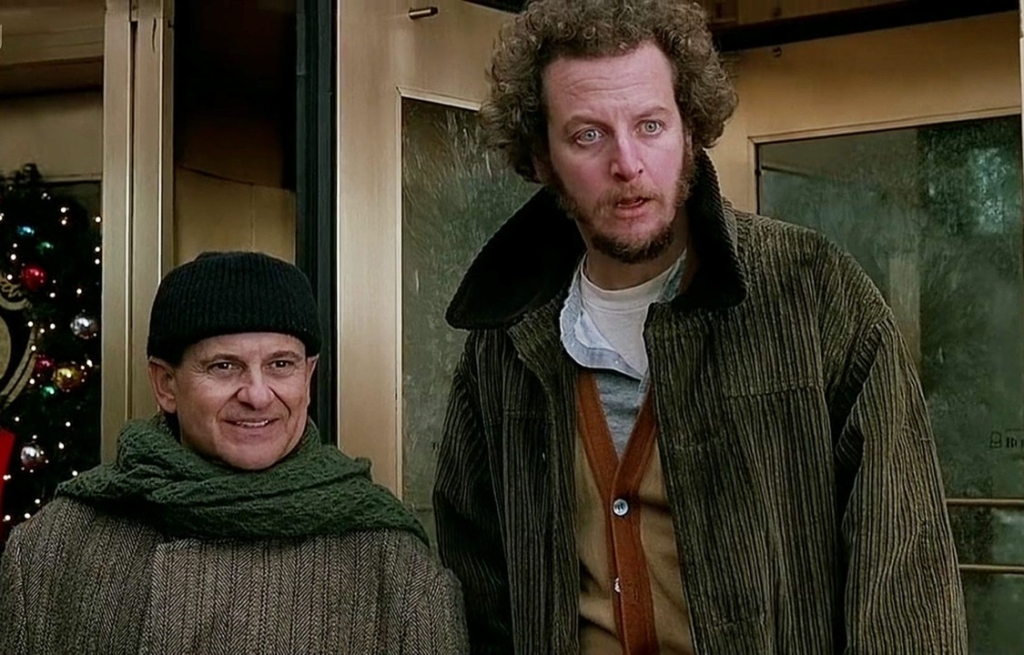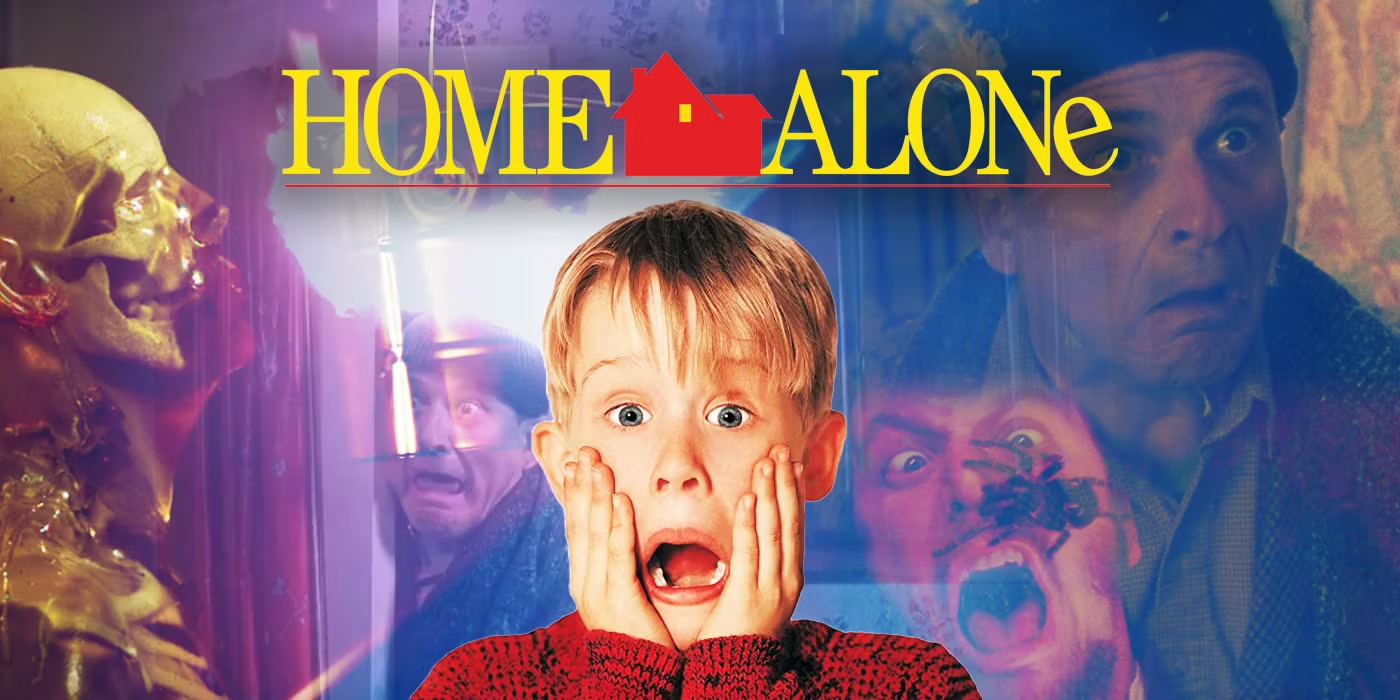Released in 1990, “HOME ALONE”, directed by Chris Columbus and written by John Hughes, is a holiday classic that has entertained audiences worldwide for decades. Starring Macaulay Culkin as the mischievous and resourceful eight-year-old Kevin McCallister, Home Alone tells a humorous and heartwarming story of a young boy left alone over Christmas and his efforts to defend his house from two bumbling burglars. Blending comedy, family themes, and holiday spirit, Home Alone became one of the highest-grossing films of its time and left an enduring mark on popular culture. The film’s unique premise, relatable characters, and underlying messages of family and resilience contributed to its widespread popularity and lasting impact.

The story of Home Alone begins with the chaos of Christmas preparations in the McCallister household. Kevin, the youngest in a large family, feels neglected and frustrated as his relatives ignore him and his siblings tease him. On the night before a planned family trip to Paris, Kevin argues with his family, ultimately wishing they would all disappear. That night, a storm causes a power outage, which leads to the family oversleeping and rushing to the airport the next morning. In their haste, they forget Kevin, who remains asleep at home, unknowingly left behind.
When Kevin wakes up to find himself alone, he initially celebrates his newfound independence, enjoying the freedom to do whatever he wants. He eats junk food, watches grown-up movies, and even jumps on his parents’ bed, all while relishing his “wish come true” of being on his own. However, Kevin soon realizes that he has more serious responsibilities, especially when he discovers that two burglars, Harry (played by Joe Pesci) and Marv (played by Daniel Stern), are planning to break into his house. Determined to protect his home, Kevin devises a series of clever and comical traps to outwit the burglars, leading to a series of slapstick confrontations that provide the film’s most memorable moments.

As the story progresses, Kevin also begins to miss his family, realizing the value of their love and presence in his life. He learns important lessons about responsibility, bravery, and independence. Meanwhile, his mother, Kate, realizes her mistake and makes a desperate journey back home to be reunited with Kevin, showing the lengths a parent will go to for their child. In the end, Kevin successfully defends his home from the burglars, and his family returns on Christmas Day, grateful to be reunited.
Home Alone became a global phenomenon for several reasons, capturing audiences’ hearts with its perfect blend of humor, holiday spirit, and family themes. One of the main reasons for its popularity was its unique premise. The idea of a child being left alone to fend for himself, especially against burglars, was both exciting and relatable for young viewers who could imagine themselves in Kevin’s shoes. The film’s slapstick humor, particularly the inventive traps Kevin sets for the burglars, resonated with audiences of all ages, adding to the film’s universal appeal. Scenes like the iconic paint cans swinging down the staircase and the icy steps became iconic, showcasing a level of creativity and humor that made the film stand out.
Macaulay Culkin’s performance as Kevin was another key factor in the film’s success. His charm, wit, and humor brought Kevin to life, making him a character that audiences loved and rooted for. Culkin’s natural charisma made Kevin’s journey both entertaining and endearing, and he quickly became one of the most recognized child actors of his time. His mischievous grin and clever comebacks were memorable, and his transformation from a frustrated younger sibling to a self-reliant, resourceful hero resonated with viewers.
Home Alone also resonated deeply due to its holiday setting and its underlying themes of family, forgiveness, and the importance of togetherness. The film’s release around the holiday season made it an ideal family movie, and its Christmas backdrop added warmth and nostalgia that appealed to audiences. Kevin’s initial frustration with his family, followed by his realization of how much he misses them, mirrored real-life family dynamics, especially during the holiday season when emotions and tensions often run high. His journey of self-discovery and understanding reinforced the value of family, forgiveness, and love, themes that resonate strongly during the holiday season.
In addition to its entertainment value, Home Alone also carried an underlying message about resilience and independence. Kevin’s journey from a dependent child to a resourceful, courageous figure who faces his fears is a powerful narrative of personal growth. Left to his own devices, Kevin learns to take care of himself and defend his home, demonstrating bravery and quick thinking. This journey of self-reliance and confidence-building resonated with young viewers, showing them that they, too, could overcome challenges and handle responsibilities.
Home Alone’s impact extended beyond its story and characters, leaving a lasting cultural legacy. The film became a holiday tradition for many families, with annual screenings during the Christmas season becoming a beloved ritual. Its memorable quotes, such as “Keep the change, ya filthy animal!” and “I made my family disappear,” entered popular culture, adding to its iconic status. The movie’s success also led to sequels and a series of merchandise, from toys and games to holiday-themed items, making Home Alone a staple of the holiday entertainment landscape.
The film’s influence on the family comedy genre and holiday films is evident even today. Home Alone set a new standard for holiday movies, combining humor, heart, and adventure in a way that appealed to audiences of all ages. Many family comedies and holiday films that followed tried to replicate its formula, blending family themes with slapstick humor and child-centered narratives. The movie also popularized the idea of “holiday hijinks,” where a child or family faces amusing and sometimes outrageous challenges during the Christmas season, a concept that has been reused in numerous holiday films and TV specials.
In a broader sense, Home Alone tapped into universal feelings of independence, adventure, and the importance of family. Kevin’s experience of being left alone to handle adult responsibilities resonated with audiences on multiple levels. For children, it represented an exciting fantasy of independence and empowerment, showing that even a young person could face daunting challenges. For adults, it served as a reminder of the value of family and the importance of staying connected, especially during the holidays. The movie’s themes of family, bravery, and self-discovery made it more than just a comedy; it became a story of growth and resilience that resonated with viewers across generations.
The cultural impact of Home Alone extended into popular culture and even everyday life. The film’s success inspired parodies, homages, and references across media. Many people can relate to Kevin’s antics, and the idea of a “home alone” situation has become a familiar trope in pop culture, often referenced in movies, TV shows, and commercials. Kevin’s ingenuity and his creative use of household items to fend off intruders sparked the imagination of young audiences, making him an icon of resourcefulness and quick thinking.
The film’s legacy is also reflected in the way it inspired a sense of nostalgia and community. Families around the world continue to watch Home Alone together during the holidays, passing down the tradition to younger generations. The movie’s success showed that a simple, heartfelt story with relatable characters could become a cultural staple. It also demonstrated the enduring appeal of family-centered comedies, especially those that celebrate resilience, humor, and the joy of togetherness.
In conclusion, Home Alone is more than just a holiday comedy; it is a timeless story that has resonated with audiences for over three decades. Its combination of humor, adventure, and heartfelt themes has made it a beloved classic that appeals to viewers of all ages. The film’s exploration of independence, family values, and the importance of forgiveness offers a meaningful message, particularly during the holiday season when family bonds are often celebrated and cherished.
The legacy of Home Alone continues to thrive, as it remains a holiday staple and a source of nostalgia for generations who grew up with Kevin McCallister’s adventures. Its influence on family films, holiday traditions, and popular culture is undeniable, and its messages of courage, self-discovery, and family love resonate just as strongly today as they did in 1990. Through its humor, heart, and timeless appeal, Home Alone reminds audiences of the importance of family, the power of resilience, and the joy of coming together during the holidays.

